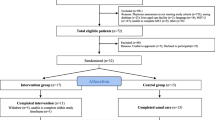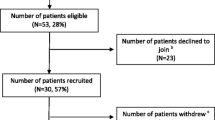Abstract
Objective
Patients undergoing chemotherapy frequently suffer from gastrointestinal (GI) symptoms and functional difficulties in preparing and eating meals. We conducted a qualitative assessment of an integrative cuisine workshop program designed for patients receiving chemotherapy, examining the effects of the program on patient-reported GI symptoms and nutritional challenges.
Patients and methods
Patients were referred to a complementary/integrative medicine (CIM)-trained physician for consultation, followed by a patient-tailored treatment program. Patients with GI-related symptoms and nutritional concerns were offered a two-session integrative cuisine workshop program. The effects of the workshops were examined using inductive and deductive qualitative research methodologies. Patient narratives, as recorded in the Measure Yourself Concerns and Wellbeing (MYCAW) study tool, and electronic medical files were analyzed.
Results
Of 125 patients referred to the integrative cuisine program, 86 participated in at least one workshop. Participants and non-participants had similar demographic and disease-related characteristics, as well as quality-of-life (QOL)-related concerns. Inductive analysis suggested that participation in the workshops was helpful in developing social relationships, providing emotional support, and enhancing spirituality and nutritional awareness. Implementing the recommended changes at home led to improved QOL-related outcomes. The predominant themes derived from deductive analysis were the implementation of dietary changes and improved gastrointestinal and emotional issues.
Conclusions
Chemotherapy-treated patients participating in an integrative cuisine workshop program showed improved QOL outcomes, specifically GI and emotional-related symptoms, and a reduction in nutritional and functional concerns. Increased knowledge and awareness of nutrition and supplement use ultimately resulted in implementation of the CIM recommendations by patients at home.


Similar content being viewed by others
References
Lau LK, Mok E, Lai T, Chung B (2013) Quality-of-life concerns of Chinese patients with advanced cancer. Soc Work Health Care 52(1):59–77
McGrath P (2002) Reflections on nutritional issues associated with cancer therapy. Cancer Pract 10(2):94–101
Bernhardson BM, Tishelman C, Rutqvist LE (2009) Taste and smell changes in patients receiving cancer chemotherapy: distress, impact on daily life, and self-care strategies. Cancer Nurs 32(1):45–54
Borbasi S, Cameron K, Quested B, Olver I, To B, Evans D (2002) More than a sore mouth: patients’ experience of oral mucositis. Oncol Nurs Forum 29(7):1051–1057
Hwang SS, Chang VT, Rue M, Kasimis B (2003) Multidimensional independent predictors of cancer-related fatigue. J Pain Symptom Manag 26(1):604–614
Olver IN, Eliott JA, Koczwara B (2014) A qualitative study investigating chemotherapy-induced nausea as a symptom cluster. Support Care Cancer 22(10):2749–2745
Tong H, Isenring E, Yates P (2009) The prevalence of nutrition impact symptoms and their relationship to quality of life and clinical outcomes in medical oncology patients. Support Care Cancer 17(1):83–90
Kroenke C, Rosner B, Chen W, Kawachi I, Colditz G, Holmes M (2004) Functional impact of breast cancer by age at diagnoses. J Clin Oncol 22:1849–1856
Neymark N, Crott R (2005) Impact of emesis on clinical and economic outcomes of cancer therapy with highly emetogenic chemotherapy regimens: a retrospective analysis of three clinical trials. Support Care Cancer 13(10):812–818
Ben-Arye E, Schiff E, Shapira C, Frenkel M, Shalom T, Steiner M (2012) Modeling an integrative oncology program within a community-centered oncology service in Israel. Patient Educ Couns 89(3):423–429
Almog L, Lev E, Schiff E, Linn S, Ben-Arye E (2014) Bridging cross-cultural gaps: monitoring herbal use during chemotherapy in patients referred to integrative medicine consultation in Israel. Support Care Cancer 22(10):2793–2804
Ben-Arye E, Massalha E, Bar-Sela G, Silbermann M, Agbarya A, Saad B, Lev E, Schiff E (2014) Stepping from traditional to integrative medicine: perspectives of Israeli-Arab patients on complementary medicine’s role in cancer care. Ann Oncol 25(2):476–480
Paterson C, Thomas K, Manasse A, Cooke H, Peace G (2007) Measure Yourself Concerns and Wellbeing (MYCAW): an individualized questionnaire for evaluating outcome in cancer support care that includes complementary therapies. Complementary Ther Med 15(1):38–45
Oldenmenger W, de Raaf P, de Klerk C, van der Rijt C (2012) Cut points on 0–10 numeric rating scales for symptoms included in the Edmonton symptom assessment scale in cancer patients: a systematic review. J Pain Symptom Manag. doi:10.1016/j.jpainsymman.2012.06.007
Keshet Y, Schiff E, Samuels N, Ben-Arye E (2014) Giving voice to cancer patients: assessing non-specific effects of an integrative oncology therapeutic program via short patient narratives. Psycho-Oncology. doi:10.1002/pon.3621
Hsieh H, Shannon SE (2005) Three approaches to qualitative content analysis. Qual Health Res 15(9):1277–1288
Todres L, Galvin KT, Holloway I (2009) The humanization of healthcare: a value framework for qualitative research. Int J Qualitative Stud Health Well-Being 4:68–77
Yehuda A (1982) A place like that. From: time of grace. Schocken Publishing House, Tel-Aviv, p 102
Bourke L, Homer KE, Thaha MA, Steed L, Rosario DJ, Robb KA, Saxton JM, Taylor SJ (2013) Interventions for promoting habitual exercise in people living with and beyond cancer. Cochrane Database Syst Rev 9:CD01019
Gotay CC (2005) Behavior and cancer prevention. J Clin Oncol 23(2):301–310
von Gruenigen VE, Courneya KS, Gibbons HE, Kavanagh MB, Waggoner SE, Lerner E (2008) Feasibility and effectiveness of a lifestyle intervention program in obese endometrial cancer patients: a randomized trial. Gynecol Oncol 109(1):19–26
Allen SM, Shah AC, Nezu AM, Nezu CM, Ciambrone D, Hogan J, Mor V (2002) A problem-solving approach to stress reduction among younger women with breast carcinoma: a randomized controlled trial. Cancer 94(12):3089–3100
Bourke L, Gilbert S, Hooper R, Steed LA, Joshi M, Catto JW, Saxton JM, Rosario DJ (2014) Lifestyle changes for improving disease-specific quality of life in sedentary men on long-term androgen-deprivation therapy for advanced prostate cancer: a randomised controlled trial. Eur Urol 65(5):865–872
Ben-Arye E, Kruger D, Samuels N, Keinan-Boker L, Shalom T, Schiff E (2014) Assessing patient adherence to a complementary medicine treatment regimen in an integrative supportive care setting. Support Care Cancer 22(3):627–44
Lemoignan J, Chasen M, Bhargava R (2010) A retrospective study of the role of an occupational therapist in the cancer nutrition rehabilitation program. Support Care Cancer 18(12):1589–1596
King James Bible “Authorized Version”, Cambridge Edition. Psalms 23:4
Acknowledgments
We thank the Israel Cancer Society for their generous financial support for the Integrative Cuisine Workshop project at the Lin Medical Center, Haifa, Israel. Eran Ben-Arye, Inbar Miller Shahbar, Michal Livne Aharonson, Liora Preis, and Olga Agour designed and conducted the research and analyzed the data. Yael Keshet, Elad Schiff, and Noah Samuels analyzed the data and wrote the paper with Eran Ben-Arye. Eran Ben-Arye and Noah Samuels had primary responsibility for the final content. Marianne Steinmetz edited the English manuscript.
Authors’ contributions
Dr. Ben-Arye was responsible for the conception and design of the study, acquisition of the data, analysis and interpretation of the data, drafting the article and revising it critically for important content, and final approval of the version to be submitted. Dr. Keshet, Dr. Samuels, and Dr. Schiff were responsible for the conception and design of the study, analysis and interpretation of the data, drafting the article and revising it critically for important content, and final approval of the version to be submitted. Ms. Miller Shahbar, Ms. Livne Aharonson, Ms. Agour, and Ms. Preis were responsible for the conception and design of the study, acquisition of the data, analysis and interpretation of the data, and final approval of the version to be submitted.
Funding
While the integrative cuisine workshop for cancer patients received funding from the Israel Cancer Society, no research grant has been awarded for this project.
Compliance with ethical standards
ᅟ
Conflict of interest
The authors declare that they have no competing interests.
Ethics statement
The study protocol and proceedings underwent review and approval by the Ethics Review Board at the Carmel Medical Center, Haifa. The study protocol was registered at ClinicalTrials.gov (NCT01860365).
Author information
Authors and Affiliations
Corresponding author
Rights and permissions
About this article
Cite this article
Ben-Arye, E., Keshet, Y., Shahbar, I.M. et al. The kitchen as therapy: qualitative assessment of an integrative cuisine workshop for patients undergoing chemotherapy. Support Care Cancer 24, 1487–1495 (2016). https://doi.org/10.1007/s00520-015-2934-z
Received:
Accepted:
Published:
Issue Date:
DOI: https://doi.org/10.1007/s00520-015-2934-z




